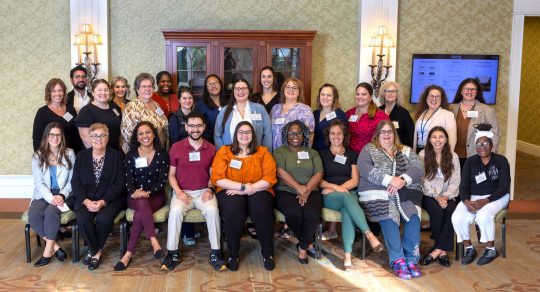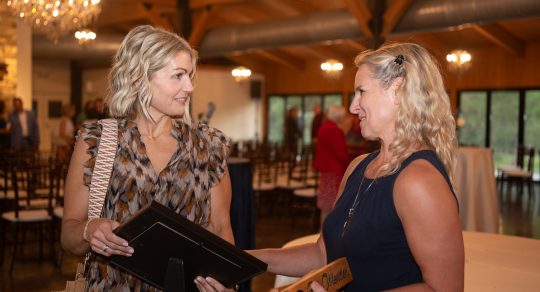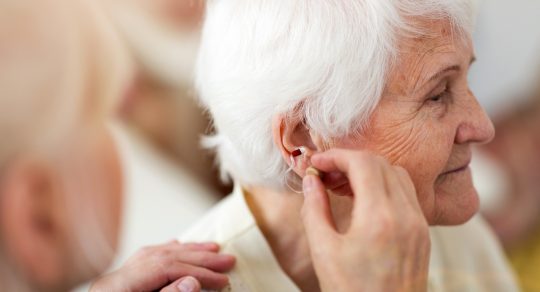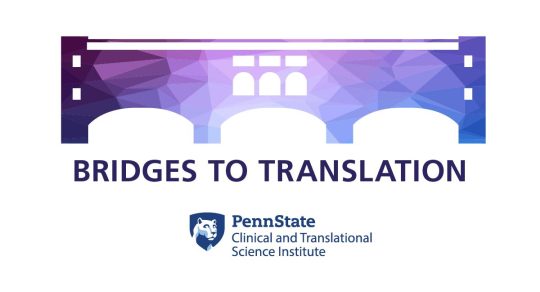Fellowship
Geriatric Medicine
The Geriatric Medicine Fellowship at Penn State Health Milton S. Hershey Medical Center is a one-year, ACGME-accredited position that admits two fellows per year.
Explore More
The ACGME-accredited Geriatric Medicine Fellowship, launched in 2019, operates under the auspices of the Division of Internal Medicine in Penn State Health' Department of Medicine to train residents who have completed either family medicine or internal medicine residency in the discipline of geriatrics.

Program Overview
Geriatrics is rapidly emerging as a need for communities across the nation as America gets older. By the year 2030, nearly a quarter of the U.S. population will be older than 65. As of 2023, Pennsylvania was the ninth “oldest” state of the nation. Penn State Health Milton S. Hershey Medical Center is a large institution with more than 540 beds. Penn State Health Milton S. Hershey Medical Center has the advantage of being the primary quaternary referral center for central Pennsylvania that caters to an aging population. This broad base yields a range of diverse pathology, allowing trainees to see both common and less-common diseases. Annual admissions exceed 28,000 per year, with more than 1 million outpatient visits and more than 72,000 emergency room visits.
Learn More about the Fellowship
The Geriatric Medice Fellowship aims to do the following:
train the fellow in treating and managing geriatric patients across the continuum with a deep understanding of geriatric principles;
teach the science of aging and longevity, comprehensive multi-domain geriatric assessment, principles of rehabilitation, psycho-social supports, nutrition, etiquette of geriatric pharmacology, geriatric psychiatry and ethics in a patient centered way;
teach the basics of research methodologies and the wider impact of aging in communities and its interface with the economics of medicine; and
create a cohort of geriatric experts in central Pennsylvania who cater to an aging Pennsylvania community and connect the clinician with community resources and facilitate the best interdisciplinary care for older adults with the other disciplines of social work, pharmacy and post-acute care networks.
Applications are only accepted through ERAS in accordance to the NRMP Specialties Matching Service policies and schedules.
Refer to the official AAMC ERAS fellowship website for details.
For informal inquiries, contact the program.
Schedule and rotations are adapted to individual fellow interests. The fellow will have valuable rotations through the following sites:
Lebanon VA Medical Center
Oak Hill Village for long-term care
Hospice of Central Pennsylvania
Penn State Health Milton S. Hershey Medical Center Rehab Hospital
In addition, geriatric fellows will care for diverse patient populations across a variety of other settings: the continuity clinic based at Penn State Health’s East Campus in Hershey; Dementia Clinic with Dr. Rollin Wright; Harmony at Hershey (assisted living) with Dr. Leah Ross; as part of the inpatient consult team; other long term care facilities and more. Telemedicine is incorporated throughout all rotations as applicable. The division is supported by a dedicated outpatient social worker.
Electives in Rheumatology, Neurology, ALS, Department of Aging, Pain clinic and addiction medicine may also be chosen.
The fellow will participate monthly in two Geriatric didactic series: Current Topics in Geriatrics and Geriatrics Core Curriculum. The fellow is assigned to present at these at least 1-2 times per year, including at least one journal club. This diverse didactic experience not only supports the geriatric fellow’s education, but also provides opportunities to present, evaluate others and discuss relevant articles.
Some topics include:
Geriatric syndromes
End of life
Geri-psychiatry
Capacity
Abuse of older adults
Frailty
Transitions of care and health inequities in older adults
Dedicated research time is also allotted at a minimum of two weeks, but is flexible and easily able to be increased depending on personal interests and goals. There is also protected didactic time for these sessions, the Geriatric Core Curriculum, quality improvement activities and asynchronous learning. Each year the fellow completes a QI project and submits an abstract to American Geriatric Society and Post-Acute and Long-Term Care Medical Association (PALTMed) which historically have been accepted yearly. The fellows are encouraged and financially supported to attend the annual conferences of these societies.
The geriatric fellow will have a multitude of academic and professional resources available to them through Penn State Health. Some resources include:
Clinician-educator track
The geriatric fellow will get a chance to collaborate with house staff from the following areas:
Trauma Surgery
Pharmacy
Physical Therapy
Pastoral Services
Fellows and students from other departments throughout the hospital
Leadership


Program Coordinator, Geriatric Medicine Fellowship and Pulmonary/Critical Care Medicine Fellowship, Medicine

Administrative Associate, Geriatric Medicine Fellowship and Hospice and Palliative Medicine Fellowship, Medicine



